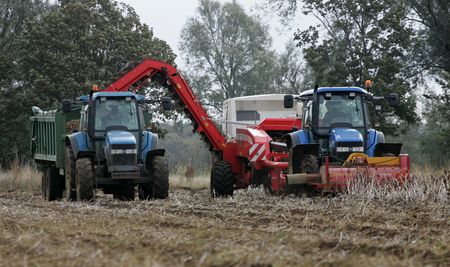Climate heralds warmer prospects

At the last British Potato event in 2005, you probably did not give climate change a second thought. Since then your crop has borne floods, heavy rain events and temperature extremes rarely experienced in the UK. Climate change has now climbed to the top of the political agenda, and consumer buying behaviour has moved on.
So where does this leave the business of growing and selling potatoes? This is the brief the British Potato Council has given to the four speakers invited to address the BPC conference at British Potato 2007, along with the theme “A Challenging Future”.
For Anton Haverkort, research manager at Plant Research International at Wageningen University in Holland, warmer springs, more frequent heavy rain events and earlier crop development are just the minor changes you will notice. The keen-eyed grower will also spot the opportunities they present.
“While the UK may have had a drenching this summer, the Mediterranean sweltered in record-breaking temperatures. So growers in the region are looking to plant earlier. That’s an opportunity for UK seed growers, who can produce seed with the right physiological age in November, rather than January or February,” he says.
Dr Haverkort points to meteorological and crop physiology data that suggest GB growers will face some fairly big changes in the way they grow crops. “Climate change has the potential to rewrite the rules on best practice,” he notes.
So is this a chance or a challenge? Sean Rickard, senior lecturer in business economics at Cranfield University, believes there is more to look forward to than to fear.
“The potato sector is actually rather well placed to benefit from climate change,” he notes. “The market for arable commodities will get more volatile, but potato growers have managed for some time without price support.
“Those that have learned to cope with the volatility are sure to reap the rewards as society wakes up to the economic realities of feeding a burgeoning population from dwindling resources.”
Mr Rickard, a key influencer of government on agricultural policy, believes growers should learn to adapt to more regulation and legislation. “If you want to prosper, you have to invest.”
But investment can be fruitless if you know little about the people buying your product. Senior research scientist Sir Colin Berry believes the agricultural industry has been on the back foot for too long. “That approach doesn’t win hearts and minds.”
Former chairman of the Advisory Committee on Pesticides, and member of the UK committees on Safety of Medicines and on Toxicity, he has studied closely how consumers react to such controversial issues.
“It’s hard to sway public opinion with hard facts or data alone. Being more proactive will reap rewards. People are very susceptible to a mantra, even if there’s little evidence that backs it up – phrases such as ‘five-a-day’ are trusted far more in our society than the benefits of genetically-modified crops, for example, despite the wealth of evidence that supports their safety. So positive messages about potatoes will achieve far more than a defence of any perceived downsides.”
James Walton, chief economist at the Institute of Grocery Distribution (IGD), is clear about how the potato industry should be more proactive. “The rising importance of the ethical consumer is a trend you’d be ill-advised to ignore. That doesn’t mean to say quality is less important, but it has become a basic condition. Ethics provides the marketing tool.”
At the conference he will reveal the latest findings from the IGD’s annual survey of 4000 consumers. “We’re seeing a massive change in consumer behaviour as climate change moves up the political agenda. It’s important that primary producers understand the reasons for this and what it means for their businesses,” he says.

Climate change means potato growers will face some big changes in the way they grow their crops.
| British Potato 2007 |
|---|
|

